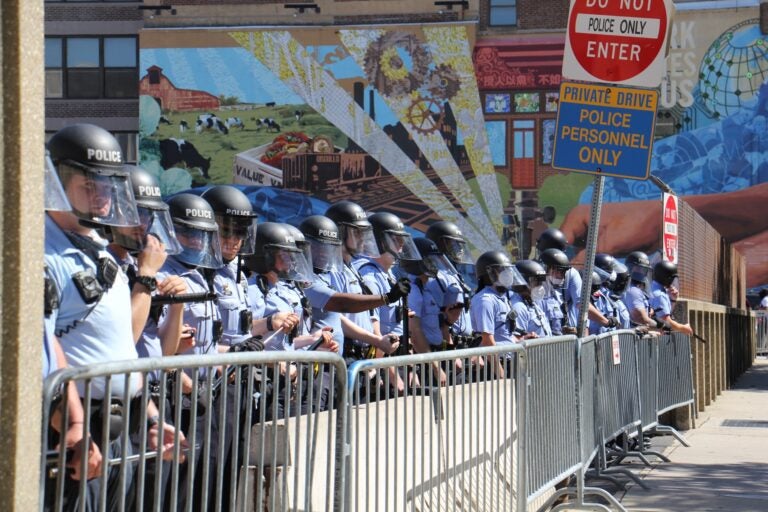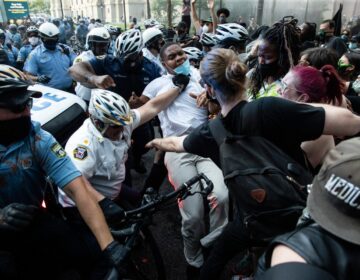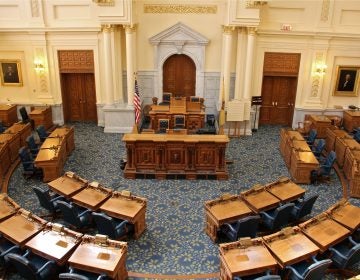Pa. Dems think public opinion on police reform is on their side
Democrats’ police reform bill isn’t likely to pass the Republican-controlled Senate. But Pa. reps say they think they have a public opinion advantage.

Philadelphia police protect the entrance to police headquarters on 8th Street as protesters march by on Saturday, May 30, 2020. (Emma Lee/WHYY)
A group of Pennsylvania’s congressional Democrats say that although Republicans haven’t gotten on board with a policing reform bill the U.S. House passed this week, they believe they’re already winning in the court of public opinion.
The measure that made it through the House with unanimous support from Democrats and votes from three Republicans would ban federal police from using chokeholds. It would also do away with no-knock warrants in drug cases, and would make it easier to penalize police for misconduct by lowering legal standards for pursuit of criminal and civil penalties.
House GOP leaders expressed discontent after, they said, Democrats rejected their amendments. An effort to pass a version of policing reform in the narrowly GOP-controlled Senate also foundered, when Democrats refused to put up votes to debate the measure.
That bill was sponsored by South Carolina U.S. Sen. Tim Scott, the chamber’s only Black Republican.
It took a softer tack than Democrats want. It would use incentives, new federal reporting requirements and changes to police training — not mandates — to reduce use of chokeholds. It would also include grant programs for body cameras and would make lynching a federal hate crime.
It also includes a provision that would create a national database to track police misconduct — something Democrats want.
U.S. Rep. Mary Gay Scanlon, a Democrat who represents Pennsylvania’s 5th District centered in Delaware County, said she thinks that bit of common ground will be a good jumping-off point for future negotiations.
“People seem to recognize that it’s a problem if you have police officers who are disciplined for misconduct in one jurisdiction and then they pick up and go someplace else,” she said.
U.S. Rep. Dwight Evans, a fellow Democrat who represents the 3rd Congressional District in Philadelphia, noted there are certain provisions on which he and other Democrats are unwilling to compromise.
“They can’t be for chokeholds. That’s very clear. That should absolutely be against the law,” he said. “That should not be something that is negotiable, middle ground.”
Scanlon, Evans and U.S. Rep. Madeleine Dean, of the 4th District based in Montgomery County, said on a Friday phone call with reporters that they feel emboldened by weeks of recent, nationwide protest — and overall public sympathy for those protests — to push for stronger reform bills than they might be able to achieve otherwise.
In the month since George Floyd was killed by Minneapolis police, people around the country have been steadily taking to the streets for demonstrations against police brutality and racism. In Philadelphia, the protests have continued unabated every weekend.
Widely-circulated videos of police using pepper spray and rubber bullets to disperse protesters have also fed into calls for policing reform.
In early June in Philly, city law enforcement unleashed tear gas on a group of protesters marching on a highway, trapping some of them between the road and a wall at the top of a steep embankment. Footage of the incident was a source of particular outrage on social media, and after weeks of reporting that showed the Philadelphia Police Department’s version of events — that protesters had gotten violent — didn’t line up with those videos, the New York Times released a 3-D rendering of the incident showing that protesters had perpetrated no observable violence.
PPD Commissioner Danielle Outlaw and Mayor Jim Kenney both apologized Thursday, announced that one officer would be fired and a commander would be demoted, and issued a temporary moratorium on use of tear gas and pepper spray on people who are not “armed and dangerous.”
In Pennsylvania specifically, there’s been little national polling since the demonstrations began. But a recent survey from Siena College and the New York Times gives a snapshot of where the commonwealth’s voters say they stand.
Asked, for instance, whether they think “George Floyd’s death was an isolated incident” or “George Floyd’s death is part of a broader pattern of excessive police violence toward African Americans” most Pennsylvanians who responded said the latter.
The survey isolated responses to six distinct regions: Allegheny County, Eastern Pa., the Northeast, Philadelphia, the Philadelphia suburbs and the rest of Pa. The numbers saying Floyd’s death was part of a pattern ranged from 46% in more rural parts of the state to 86% in Philadelphia. The Philadelphia suburbs came in at 61%.
Protesters have been broadly calling for local, state and federal officials to defund police departments. The meaning of that call varies depending on who is making it, from total abolition, to disarming to simply reducing funding and routing it into other community programs.
Dean said she doesn’t believe the House police reform bill was even particularly radical.
“The question,” she said, “should be posed to the Republicans on our committee, the Republican leadership here in the house as well in the Senate, to say, what in God’s name is unacceptable in this bill?”

Show your support for local public media
WHYY is your source for fact-based, in-depth journalism and information. As a nonprofit organization, we rely on financial support from readers like you. Please give today.





